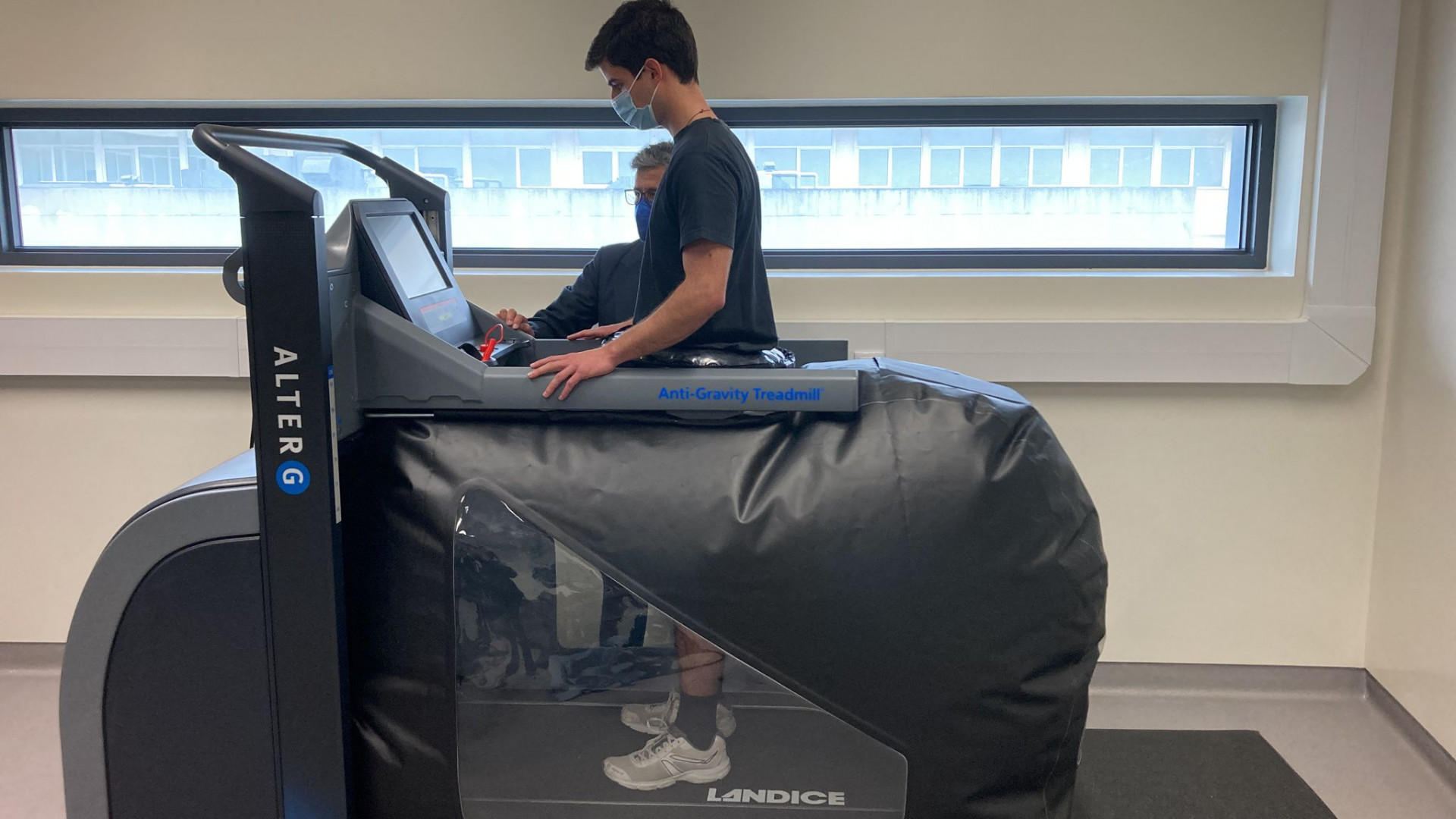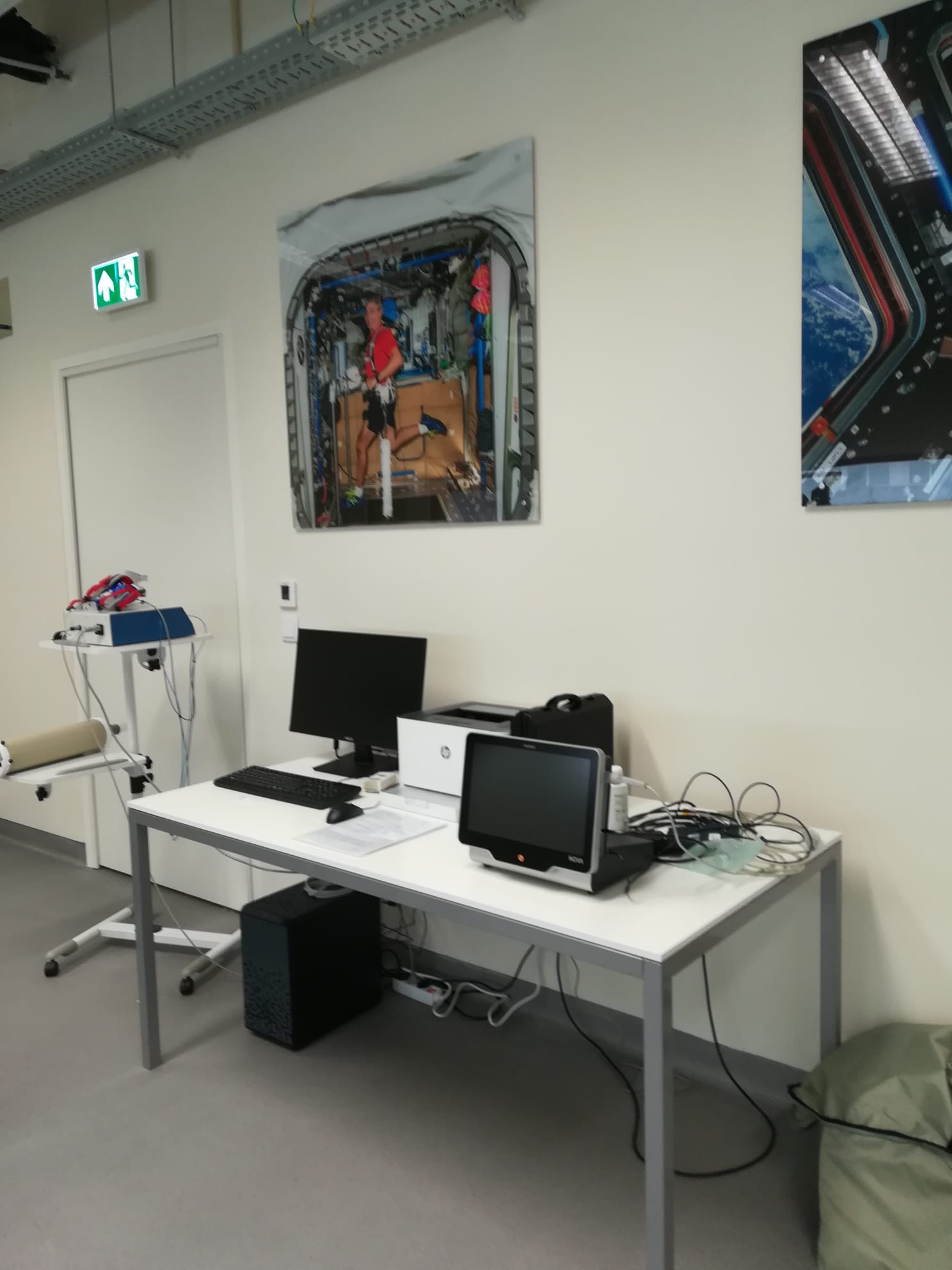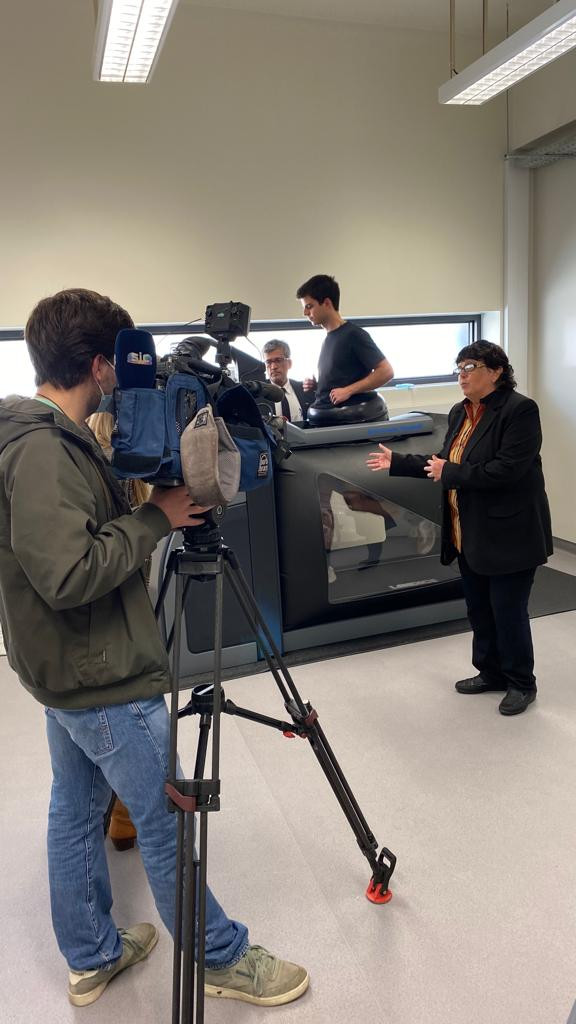
There is no morning when the scenery in the sky is different. Swallows and parakeets fly across the sky in various manoeuvres that would take us years to perform the same in an Air Force fighter or a fraction of a second to imagine ourselves being a bird and seeing the ground from a higher level.
Taking your feet off the ground and having the sensation of levitating is now possible on the Alter G, a highly sophisticated treadmill whose capacity allows to take weight off those who walk on it. The wish is quite simple, to recreate the human weight on the moon and have only 20% of the real weight or go to Mars and maintain 40% of that same weight. Pedro is the Medicine student who accepts the challenge of being an astronaut on Mars or on the moon, depending on whether Nelson Vinagre, Professor of Human Motricity, reprograms the treadmill so that it has more or less cosmic percentage. Those who think that this treadmill is just to be used in space are wrong, this is an advanced way of treating post-operative patients with various muscular and bone injuries, Nelson Vinagre explains to me, while all eyes and flashes are on Pedro, in that space that is the latest major launch of the Faculty of Medicine of the University of Lisbon.


CEMA – Centre for the Study of Aerospace Medicine was the cherished dream of two minds whose flight reaches the outer space, Edson Oliveira, neurosurgeon and assistant in Neuroanatomy and Neurosurgery, and Fausto Pinto, Director of the Faculty of Medicine. Thaís Russomano, a Brazilian doctor trained in Aerospace Medicine and currently a professor at the same Faculty, later joined this project.
Being an astronaut was not only his childhood dream; the truth is that Edson dos Santos Oliveira came into contact with Aerospace Medicine, developing research on space flight-induced neuro-ocular syndrome, a study he developed at NASA.


As a young adult he tried his luck and the merit of being an astronaut, but as this was not a possible path, his well-known networking skills remained in everything he became involved in.
On 26th April, various partners got together to celebrate this dream coming true. The Portuguese Air Force and Portugal Space as partners, Thaís Russomano and Edson Oliveira as coordinators of this new space in Portugal that looks to the sky. The implementation of what could be a dream that was too ambitious, and misfit had the support of Fausto Pinto who responded with the challenge of wanting to go further, a characteristic and ambition that is so often lacking in the Portuguese, he says. Edson Oliveira Fausto Pinto added: "Do you know the concept of serendipity? A sign of good winds that would translate into an investment of around 300 thousand Euros, only for the acquisition of equipment and the development of CEMA.
At the celebration that received special congratulations from the President of the Republic Marcelo Rebelo de Sousa and an inspired encouragement from the Rector of the University of Lisbon, Luís Ferreira, there were several elements who took the theme of space to the stage. Guillaume Weerts, head of Space Medicine at the European Space Agency (ESA), began the reflections with the lecture Medical Challenges of Space Exploration. This was followed by a round table discussion on "The Challenges of Aerospace Medicine in Portugal", moderated by Fausto Pinto, which was attended by Ricardo Conde, President of Portugal Space, Marina Lopes, Director of the Aeronautical Medicine Centre of the Portuguese Air Force and Edson Oliveira.
In a preview of what is coming soon, Thaís Russomano made the virtual visit, anticipating a dream about to begin.
The connection to Space is extensive in an agreement between the Faculty of Medicine and Portugal Space, through its main agents, the commitment has in view the collaboration in the training of Aerospace Medicine as well as in the promotion of activities in this area.
CEMA did not open its door without first applauding the unveiling of the plaque of the new and only study centre in Portugal that will study the human body's reactions to gravity alteration.
In an end of a morning of great interaction between students and Edson Oliveira, all the models and machines were tested, making the public levitate physically or by imagination, thinking which will be the next group to reach the sky. When Edson Oliveira was asked why investigate Space in a country like Portugal, the answer was "Why not?
A distance of 8 minutes and 48 seconds connects the Earth and Space. This crossing and what happens in the sky in terms of human physiology is what this centre will study, in the name of the future and defence of each country.
The moment for Edson Oliveira to celebrate the day in which the future entered the Faculty of Medicine couldn't be better.
Welcome to the future, we have already arrived!
Fausto Pinto – Director of Lisbon School of Medicine
"We have to be actors and never be satisfied with what we already have, that is our role in this Institution and, as Portuguese, we should never think that we are less".
"I continue to believe that the medical vision must be in permanent dialogue with technology".
Marina Lopes – Director of the Air Force Aerospace Medicine Centre
"With each discovery we are closer to conquering Space".
Ricardo Conde – Portugal Space
"Europe has a space gap when comparing to America because it does not yet have the capacity to launch astronauts into space. In the US it is defence that projects funding to space. But Europe needs more resilience in the space programme, and its needs are in the defence area and Space is part of this dimension."
"The aim in Space is to put buses in orbit and rent to military space stations, this is a way to secure the war battalion."
"The big bet is the triangle Earth, Moon and Mars which have positioning systems with constellations to allow hubs to be built."
"We are talking about a new economy in orbit."
"The importance of machine learning will allow to replace the doctor of the astronauts who are in Space and need immediate feedback and not several minutes of waiting."
Edson Oliveira – Neurosurgeon and Coordinator of the Centre for the Study of Aerospace Medicine
"The situation of the human body in orbit also gives us a more real perspective of man on Earth".
"The future begins today!".
Joana Sousa
Editorial Team

